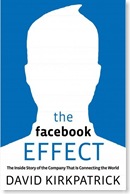 This is when I love this job. Yesterday, David Kirkpatrick came to Dell to discuss his book called The Facebook Effect (which was recently called out as an Editors Choice by the New York Times). David’s visit was part of something we call the Marketing Speaking Series, where Dell marketers are given a chance to sit down with thought leaders in the tech industry.
This is when I love this job. Yesterday, David Kirkpatrick came to Dell to discuss his book called The Facebook Effect (which was recently called out as an Editors Choice by the New York Times). David’s visit was part of something we call the Marketing Speaking Series, where Dell marketers are given a chance to sit down with thought leaders in the tech industry.
Facebook’s global growth rate is nothing short of staggering—as it closes in on 500 million+ users, it’s not showing any signs of slowing. Regardless of what you think of Facebook, there’s no denying that it continues to have a impact on how we share information and communicate on the web. And that was a big part of the discussions yesterday.
David covered lots of ground while he was here. He shared his thoughts on how Facebook and technology in general continues to impact on the world globally (see his Techonomy site for more). Beyond that, he discussed several other topics like how The Facebook Effect came to be, privacy, transparency, Facebook in China, Mark Zuckerberg as visionary, and more.
In writing the book, David had access to top execs at Facebook, including Mark Zuckerberg. According to David, Mark’s (and Facebook’s) goal overall is to connect people and facilitate the sharing of information on the Web. Given the growth rates and the data the suggests users are spending more time on Facebook, it’s hard to argue that Facebook is not succeeding on the front in my opinion.
Other things stuck with me. When David was asked about transparency, he made it clear that Zuckerberg’s view is that people have one identity… and that single identity encompasses who we are at work and who we are as individuals. David went onto say that this concept tends to resonate much better with twenty-somethings much better than folks in their fifties. In his view, Facebook could do a lot to improve. The topic of identity is one that comes up here at Dell quite a bit. That blurring between work and social continues—Microsoft’s Outlook social connector that brings Facebook (and updates from other services liked LinkedIn and MySpace) updates into corporate e-mail is the latest example.
David also compared Mark Zuckerberg to Bill Gates in some ways—saying both were focused on their visions—Gates on the idea of making the PC ubiquitous and Zuckerberg on changing the way we connect and share information at a global level much more than they were focused on making money.
Thanks to David for spending some time with us yesterday… for me and a lot of other Dell folks, I think it was time well spent. For those who want to hear more, here’s a quick discussion between David and Dell’s Director of Social Media, Adam Brown.